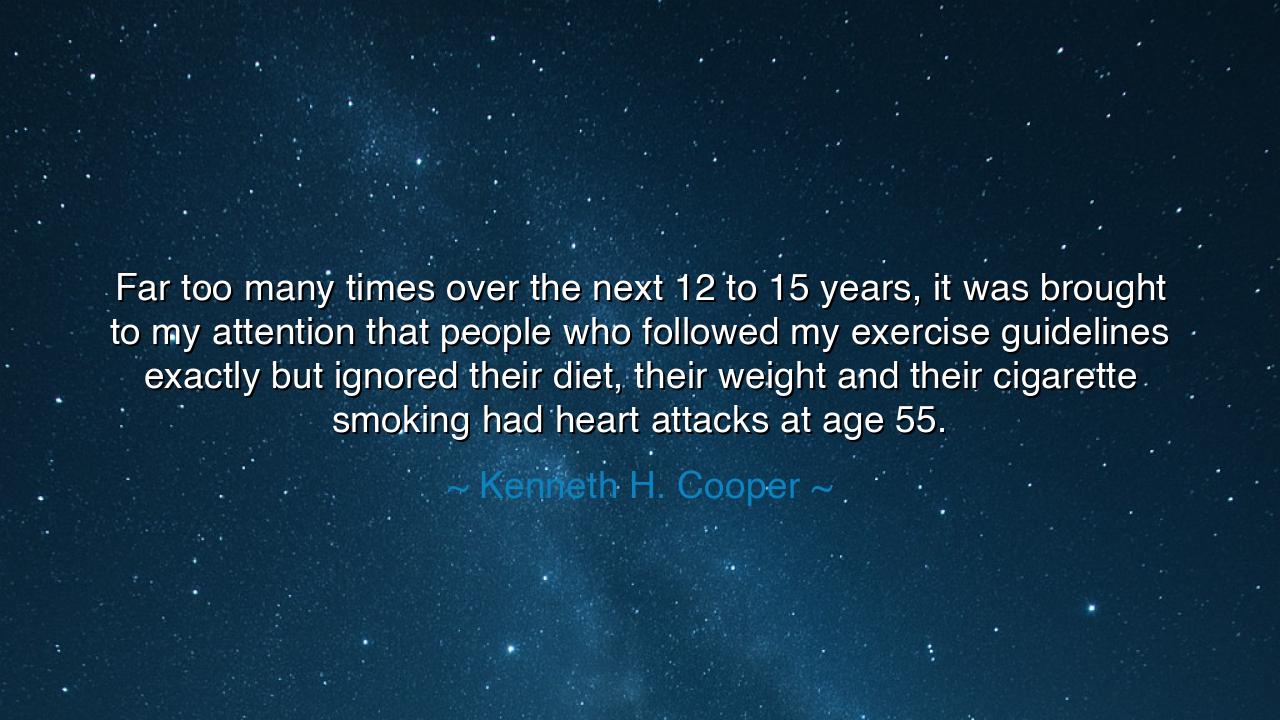
Far too many times over the next 12 to 15 years, it was brought
Far too many times over the next 12 to 15 years, it was brought to my attention that people who followed my exercise guidelines exactly but ignored their diet, their weight and their cigarette smoking had heart attacks at age 55.






When Kenneth H. Cooper said, “Far too many times over the next 12 to 15 years, it was brought to my attention that people who followed my exercise guidelines exactly but ignored their diet, their weight, and their cigarette smoking had heart attacks at age 55,” he spoke not only as a physician, but as a seer of human folly. His words carry the sorrow of one who has seen the limits of discipline without wisdom, the tragedy of effort misdirected. Beneath his scientific observation lies an ancient moral law: that health is harmony, and no part of the self—body, mind, or habit—can be neglected without consequence.
In this lament, Cooper echoes the timeless truth known to the philosophers of old: that virtue cannot be divided. To master one aspect of life while ignoring the others is to build a temple on sand. The Greeks called this balance sophrosyne—a state of moderation, wholeness, and self-command. The man who exercises but eats poorly is like a warrior who sharpens his sword while rust creeps across his armor. His strength becomes a disguise for decay. Cooper’s warning reminds us that discipline without wisdom is a false victory, for it strengthens one hand while the other opens the door to ruin.
The ancients, too, wrestled with this lesson. Consider the life of Milo of Croton, the legendary athlete of ancient Greece. His strength was unmatched; his victories in the Olympic games made him immortal in name. Yet legend tells that in his pride, he once tried to tear apart a tree with his bare hands. The trunk snapped inward, trapping his arms—and the beasts of the forest devoured him. His downfall was not in his strength, but in his blindness. He trained his muscles but not his humility; he pursued glory but not balance. So too, Cooper warns, do many in modern times cultivate fitness yet ignore the roots of health—the food, the breath, and the habits that sustain life itself.
Cooper’s words also reflect a profound understanding of interdependence—the sacred unity between body and soul, discipline and desire, choice and consequence. In his years of observation, he saw that running miles could not cleanse the arteries of poor diet, nor could sweat undo the slow poison of cigarettes. The body is not a battlefield where one virtue can conquer many vices; it is an ecosystem where every act of care—or neglect—echoes through the whole. The ancients saw this as the law of cause and effect, the rhythm of nature that spares no one, not even the diligent.
There is also humility in his revelation. For in admitting that his exercise guidance was not enough, Cooper joins the ranks of the wise who, through failure, uncover deeper truths. Like Hippocrates, who once wrote that “it is more important to know what sort of person has a disease than to know what sort of disease a person has,” Cooper came to see that health is not a formula but a way of life. Exercise may strengthen the limbs, but it cannot purify the heart—or the habits—that corrupt from within. His realization is a call to wholeness, not perfection: that no single virtue can stand without the support of its companions.
From this truth arises a lesson for all who seek longevity, excellence, or peace. Do not worship at the altar of one discipline while forsaking the rest. The scholar who reads without rest loses sight; the athlete who trains without nourishment loses strength; the leader who works without reflection loses judgment. Balance is the secret law of life—and every neglect, however small, demands a price. Cooper’s observation is thus not a criticism of exercise, but a hymn to completeness. He reminds us that a heart made strong by motion must also be protected by moderation, nourished by wisdom, and calmed by self-respect.
So let his words stand as a torch for future generations: do not mistake effort for harmony. The man who runs from disease but eats his downfall will find both chasing him in the end. Cultivate the body, yes—but also the habits that sustain it. Let diet be your ally, rest your teacher, breath your medicine. For as Kenneth H. Cooper discovered, the path to true vitality is not found in motion alone, but in the stillness of wise balance. And only when every part of life moves together, as limbs of one spirit, does health become not just endurance—but grace.






AAdministratorAdministrator
Welcome, honored guests. Please leave a comment, we will respond soon